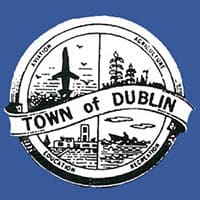Dublin Council welcomes new member
 By DAVID QUESENBERRY
By DAVID QUESENBERRY
Patriot Publishing
The Dublin Town Council at its regular meeting on May 16th conducted a public hearing on the Fiscal Year 2024-2025 budget and welcomed a new member to Council.
Town Manager Tye Kirkner told Council that the General Fund budget had increased $47,743 or 2.1 percent over last year’s budget. The total budget for the General Fund was anticipated to be $2,325,856 as compared to last year’s budget of $2,278,113. The increase he said was caused by labor costs, general inflation, and revenue stream stagnation.
The proposed budget for the Enterprise Fund was $3,961,400 as compared to last year’s budget of $3,606,000; an increase of $355,400 or 9.8 percent. Kirkner said the increase was due to labor costs and general inflation. Over the last three years he said the inflation rate had resulted in a cumulative minimum price increase of 15 percent. Material costs for the Town’s construction activities were around 30% higher each year over the last three years.
The total budget for the Town for the new fiscal year would be $6,287,256 as compared to last fiscal year’s $5,884,113; an increase of $403,143 or 6.85 percent. Kirkner felt like the budget could be maintained at that level and that it would allow the Town to do what needed to be done.
No comments from the public on the proposed budget were received during the public hearing. Council will consider final adoption of the budget at its June 20th meeting.
In other action, Council appointed Doug Poe to the Council seat vacated by Dallas Cox. Following the vote, Mayor Benny Skeens administered the oath of office formally completing Poe’s addition to the Council. Poe will serve the remainder of Cox’s term from May 17, 2024 to December 31, 2024 and is eligible to run for a full four year term in the general elections in November.
Council received a report from Assistant Treasurer Kim Dalton on the radio read utility meter system which is now in operation.
Dalton reviewed the equipment used in the field and on the towers to enter and relay utility data into the new system. She reviewed printouts for Council to show system operating data on: tower status; number of meters read; meters requiring a site visit; meters showing continuous consumption; and displays for digital equipment used by the system.
The advantages of this system she explained were early leak detection; more accurate readings; and readings in “real time.” System data is stored daily in a “cloud based” system. Currently, the staff was working out some issues experienced during the startup. The July utility billing would be the first and the most accurate using the new system.
Kirkner noted that the meters would be read by the three towers in the system which reduced time spent in meter reading from 15 to 21 days to about an hour. It was no longer necessary for employees to be in the field reading meters, but employees could be sent out in case of an indicated malfunction or blocked meter. Town staff was working with customers whose bills rose because change out of the old meters resulted billing period of 45 days. He felt that the process had gone smoothly and credited Dalton and Town employees in the field for a relatively smooth process.
In the budget report, as of April 30th, General Fund revenues were 68 percent as compared to an anticipated 83 percent budgeted. The revenue did not reflect the real estate taxes that would be due in June which would bring the revenues up to the anticipated level budgeted for the fiscal year’s end.
General Fund expenditures were 72 percent as compared to 83 percent budgeted, 11 percent less than expected.
The Enterprise Fund showed revenues of 91 percent as compared to a budgeted 83 percent which was 8 percent greater than anticipated. Likewise, Enterprise Fund expenditures were 78 percent as compared to budgeted expenditures of 83 percent.
Kirkner said the budget appeared to be “right on schedule” and maybe, in some cases, was running “a little bit ahead.”
He emphasized to Council that these were tough times for the citizens and the Town because the cost of every category of goods, services and labor were rising. He applauded Council’s willingness to maintain spending to generate as much revenue as possible. That approach he said had worked and allowed the Town to respond well to tough times as well as providing a good foundation and a better position for the Town’s finances.
Concerning grants, Kirkner reported the Town was making its third submission for the $500,000 VEDP Brownfield Multipurpose Grant. The Town was also working on a $50,000 Brownfield Assessment Grant for potential structural clearance and sampling throughout the Industrial Park.

